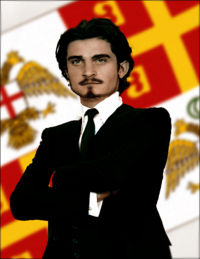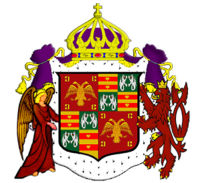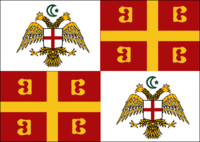Emperor Constantine Palaiologos XII

|
| Portrait | 
|
| Emperor of Greece | Constantine XII (formerly King Constantine XIV) |
| Emperor of Cyrenaica | Constantine XII |
| King of Macedonia | Constantine XII |
| Reign: | 2008 to the present. |
| Predecessor: | Position created |
| Predecessor: | Incumbent |
| Birth: | 2/15/1980, Constantinople |
| Profession: | Lawyer, Bussinessman, Politician |
| Political Party: | The Imperialist Party |
| Relgious Affiliation: | Eastern Orthodox (Ecumenical Patriarchate of Constantinople) |
| Consort | [[]] |
| Second In Command | Prime Minister Ντέιβιντ Γaλάvo |
| Spoken Languages | Greek, Aragonese, Castilian, Francien, English, and Persian. |
| Personal Arms | 
|
Early Life
Kostas Palaiologos was born February 15th, 1976 in Constantinople, the son of Pelagia Kagkadi (Πελαγία Καγκάδη) and Konstantinos Palaiologos. Although he and his paternal family all claim direct descent from the Palaiologoi Dynasty, the Roman Empire's final dynasty, such a bold claim is unsubstantiated. Many Greeks took the name in the chaos of the Ottoman occupation, most claiming to have been members of some minor scion of the prestigious family through marriage if not by blood. His father was one of the closest friends and confidant of Paul II of Greece, and the king took a strong liking to his son. During his childhood, it was discovered he was a child-prodigy, taking strongly to history, language-learning, & literature. At 21, he graduated from the Aristotle University of Thessaloniki, one of Greece's most prestigious universities, with a major in political science and a minor in applied linguistics. However, it was only when Paul's health began to wane after being diagnosed with diabetes did Constantine's father implore him to go into politics. So, he went back to school, becoming a naval officer majoring in Political science and study of the law for four years.
In order to finalize his rigorous studies, at the age of 25 he moved to Jervaine as a paralegal for four months before finding a better job in Luxembourg. The future emperor found gainful employment for eight months as an intern at a minor law office of the European Federation based in Luxembourg City (Stad Lëtzebuerg) that dealt with enforcing protected products of origin. Feeling underpaid, he successfully applied for a position as an adjunct-professor in Riu de L'Argent, but not before spending a few months in neighboring Nea Illenicia. It was at the University of Buen Ayre (A Universidat de Buen Ayre) where he gave a rather famous and recorded speech on the political-situation of his homeland that was circulated throughout Greece. Even the professors at the university were in shock at his almost enthralling oratory skills. After the year was over he returned to Greece, at the behest of his parents. It seems the chemotherapy of Paul was not enough to stave off his pancreatic cancer and his father hoped to use his influence to set his son up before the king passed.
Start of His Reign
On June 26th, 2007 King Paul II lost his battle to cancer. However, on his deathbed in his private hospital, he officially chose Constantine to marry the legal heir to the throne, his niece, Alexandra, Duchess of Sparta. Paul hoped that he could trust his best friend's son with Alexandra and that his rigorous work ethic would influence her for the better. Alexandra's parents in Køpenhavn agreed to the idea and arranged that her daughter marry this young upstart, with this arranged marriage being the best of a very bad situation. The marriage was done in private, with Alexandra converting to the Orthodox Church as a Lutheran (although as a young woman she experimented with the bizarre New Age religion movement that combined Christianity and Buddhism). The next plans were made for the coronation. It was honorary for the king to be crowned in Athens and then moving to the capital of Nafplio. However, Constantine opted for his hometown of Constantinople as the host city of his coronation and for his permanent residence. Likewise, he refused to be crowned "king consort," scandalizing Paul's family. His stubborness and absolute refusal to compromise nearly cost him his wedding and career. Despite gaining him the ire of the entire Glucksburg Family, the coronation was held in the Cathedral of the Holy Wisdom of God, something never before done by the reigning monarchs of Greece. During the days when Greece was a weak pawn thrown around by the Entente Powers and later the Germans, the occupational force of Constantinople during the 1920's forbade such an inflammatory and provocative action (the Kemrese offended that Greeks would dare call themselves Romans and the English and French fearing that it would push the Ottoman Turks nearby into another war). Many political scientists that focus on the tiny, coastal nation believe that Constantine's act cannot be explained by simple Romanophilia. They believe that the message here was deeper, and more subtle, that Constantine wanted to prove that the country was no longer privy to the demands of the European and/or Russian community.
Present Day
Politics
Costas Palaiologos was a "star" of Greek politics at a time of considerable unrest and dissatisfaction, not least with the then-current regime and the relative position of Greece in the world at large. This had given rise to numerous political parties calling for a return to glory. Eventually, they coalesced into the Imperialist Party of which Costas was one of the most popular members.
When Paul II suddenly died, resistance to the ascension of his legal heir, Alexandra, Duchess of Sparta proved intense. General strikes and petitions to bar her from the throne signed by large numbers of military officers were the most obvious sign. A compromise was worked out within two weeks of the King's passing, based on a Coalition government and the marriage of Kostas with Alexandra, with him reigning as "Constantine XIV".
The coalition did not last. In less than a month, the government lost a Vote of No Confidence. What followed was an intense, divisive, hotly debated and sometimes violent General Election that swept the Imperialist Party to power. One of the first decisions announced by new-Prime Minister David Galanis was an end to the "Kingdom of the Hellenes" and the birth of the "Hellenistic Empire". Taking their numbering system from the Byzantine Empire, the new state dubbed Costas with the name "Constantine XII". The release of all political prisoners the followed almost immediately afterwards added to the general popularity and high expectations associated with the new government. As emperor, Constantine is also helping write a new constitution that will be submitted to the voters for approval.
Foreign Relations
On 25 August 2008, King Ña'ara III of Henua presented the emperor with a finely engraved mata'a, the traditional obsidian bladed weapon of his country.
International response
The rest of the world has been simultaneously charmed and wary of Greece's handsome, popular, and ambitious new Emperor. The Luxemburger press have dubbed him "dee Baartete Bonaparte" (the Bearded Bonaparte) for his meteoric rise to the throne.
| Preceded by: Constantine XI |
 Emperor of the Hellenes 2008 – |
Heir-Apparent: Incumbent |